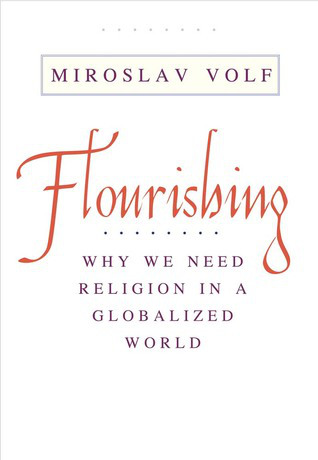
Flourishing: Why We Need Religion in a Globalized World, Miroslav Volf. New Haven, CT: Yale University Press, 2015.
Summary: Volf argues that the twin globalizing forces of international economics and world religions, problematic as they may be, may also be the source of rich and holistic flourishing for the human community.
There has been a compelling argument by Thomas Friedman and others that the global forces of economic development actually create significant incentives for international co-operation, which facilitates economic development for all concerned. At the same time, others have argued that the major global religions may undermine international co-operation and mutual efforts toward human flourishing because of their exclusivistic truth claims. In this book, which Miroslav Volf describes as a “programmatic essay”, the contention is advanced that there is a way to conceive of the intersection of these often overlapping or competing visions, that may more profoundly promote human flourishing in all its dimensions.
Volf’s argument proceeds as follows (corresponding to the chapters in the book):
- Economic globalization alone often reduces human beings to their material concerns alone whereas the world religions bring to bear a “transcendent” focus that provides purpose, moral underpinnings, and cultural richness to the idea of human flourishing, that are lost in purely economic accounts of globalization.
- At the same time, economic globalization challenges religious communities to transcend violence, which often arises from particular political identifications, and helps make possible efforts at uniting humanity and addressing global goals (health, education, meaningful work) that promote values consonant with religious ideas of human flourishing.
- The most deeply held principles of each religious system uphold freedom of conscience, tolerance, and genuine respect for people of other faiths or no faith at all. Between the privileging of one religion in public life, and the barring of all religious discussion from the public square, Volf, like Os Guinness, argues for a “principled pluralism” that protects religious freedom, recognizes equally the moral value and moral arguments of all its citizens, separates religion and rule, and maintains an impartial state.
- On the basis of these ideas, Volf argues, against the contentions of many, that it is possible to be religiously exclusivistic (and he would argue that each of the major faiths, when true to their core ideas are in fact so), and yet politically pluralistic, and that this pluralism is in fact may be informed by the highest principles of each faith.
- Lastly, he deals with why religions become violent, which has less to do with core religious teachings and more as a result of the consequences of close entanglement with political identities, which actually is contrary both to the global convictions of each faith (which denies us vs. them), and the fundamental commitment of each to freedom of conscience–that belief may not be compelled by others.
Volf concludes the book with a discussion of the dichotomy of meaning and pleasure and argues that the religious perspective (and Volf’s Christian perspective shows through here), when most true to itself, unites these two in the God who is love and provides a compelling account of human flourishing that unites desire and purpose.
I find Volf’s program both elegantly stated and quite persuasive. His argument protects both private and public religious expression for all faiths while rendering an account of how both economic forces and interreligious understanding may circumvent the “clash of civilizations” Samuel Huntington and others have predicted. It seems to me that two crucial questions raised by Volf’s “program” are:
- What process does Volf envision for gaining a sufficient global consensus on these principles to allow them to be enacted in international public and economic life? Or does he believe such consensus already exists, which seems disputable?
- If there is a sufficient global consensus, what process does Volf envision for dealing with outliers, those instances where political and religious identities have coalesced around violence?
It also seemed to me that the focus of the book shifted from economic to political concerns. Granted, a regime for how different religious influences engage in public life is necessary for economic flourishing, but how differing global religions engage with the global economic marketplace seems to me to need further treatment.
That said, such an undertaking is probably far beyond the scope of a “programmatic essay” of 206 pages and may require the expertise of others. I hope Volf and those he is engaged with will press forward this project in a global context where it seems we are on the razor’s edge between great danger and great opportunity.
Disclosure of Material Connection: I received this book free from the publisher. I was not required to write a positive review. The opinions I have expressed are my own. I am disclosing this in accordance with the Federal Trade Commission’s 16 CFR, Part 255 : “Guides Concerning the Use of Endorsements and Testimonials in Advertising.”
Editor’s Note: Thank-you to Bob Trube for sharing his reviews with Emerging Scholars! Bob first posted the above review on Bob on Books. I found the above review a helpful reflection as I prepare for our nation’s celebration of the Declaration of Indepence. Please join me in praying for discernment for the people of God as we seek first after the kingdom of God. To God be the glory! ~ Thomas B. Grosh IV, Associate Director, Emerging Scholars Network
Bob Trube is Associate Director of Faculty Ministry and Director of the Emerging Scholars Network. He blogs on books regularly at bobonbooks.com. He resides in Columbus, Ohio, with Marilyn and enjoys reading, gardening, choral singing, and plein air painting.

Leave a Reply